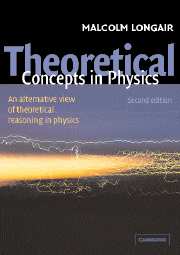Book contents
- Frontmatter
- Contents
- Preface and acknowledgements
- 1 Introduction
- Case Study I The origins of Newton's laws of motion and of gravity
- Case Study II Maxwell's equations
- Case Study III Mechanics and dynamics – linear and non-linear
- Case Study IV Thermodynamics and statistical physics
- Case Study V The origins of the concept of quanta
- Case Study VI Special relativity
- Case Study VII General relativity and cosmology
- Index
Case Study II - Maxwell's equations
Published online by Cambridge University Press: 05 June 2012
- Frontmatter
- Contents
- Preface and acknowledgements
- 1 Introduction
- Case Study I The origins of Newton's laws of motion and of gravity
- Case Study II Maxwell's equations
- Case Study III Mechanics and dynamics – linear and non-linear
- Case Study IV Thermodynamics and statistical physics
- Case Study V The origins of the concept of quanta
- Case Study VI Special relativity
- Case Study VII General relativity and cosmology
- Index
Summary
Each case study has a different emphasis and this one is as extreme as they get. The central theme is the origin of Maxwell's equations, which might seem a much more straightforward story than some of the other case studies. This was my opinion until I understood how Maxwell actually arrived at his great discovery of the displacement current. It turns out to be as remarkable an example of model building as I have encountered anywhere in physics and strikes to the heart of the nature of electromagnetism. It is also a wonderful example of how fruitful it can be to work by analogy, provided one is constrained by experiment. The story culminates in the discovery that electromagnetic disturbances propagate at the speed of light, leading directly to the unification of light and electromagnetism and to Hertz's beautiful experiments, which fully vindicated Maxwell's theory.
Along the way, we pay tribute to Faraday's genius as an experimenter in discovering the phenomenon of electromagnetic induction (Figure II.1) and many other aspects of electromagnetic phenomena. His invention of the concept of lines of force, what I have called ‘mathematics without mathematics’, was crucial to the mathematisation of electromagnetism, and to Maxwell's theoretical studies. The key role of vector calculus in simplifying the mathematics of electromagnetism provides an opportunity for revising some of that material, and a number of useful results are included in the appendix to Chapter 5.
- Type
- Chapter
- Information
- Theoretical Concepts in PhysicsAn Alternative View of Theoretical Reasoning in Physics, pp. 77 - 78Publisher: Cambridge University PressPrint publication year: 2003



